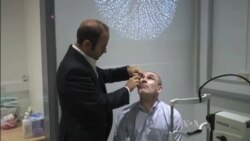Date: July 16, 2015
Source: Nanyang Technological University
Summary:= Scientists have found that existing anti-malaria drugs could be a potential treatment for Parkinson’s disease. Parkinson's disease is a degenerative disorder of the central nervous system that causes a person to lose control of motor movements, such as the ability to move his or her hands, arms, and legs.
Absolutely great news – if it works! From http://www.sciencedaily.com/releases/2015/07/150716091710.htm
Source: Nanyang Technological University
Summary:= Scientists have found that existing anti-malaria drugs could be a potential treatment for Parkinson’s disease. Parkinson's disease is a degenerative disorder of the central nervous system that causes a person to lose control of motor movements, such as the ability to move his or her hands, arms, and legs.
Absolutely great news – if it works! From http://www.sciencedaily.com/releases/2015/07/150716091710.htm


